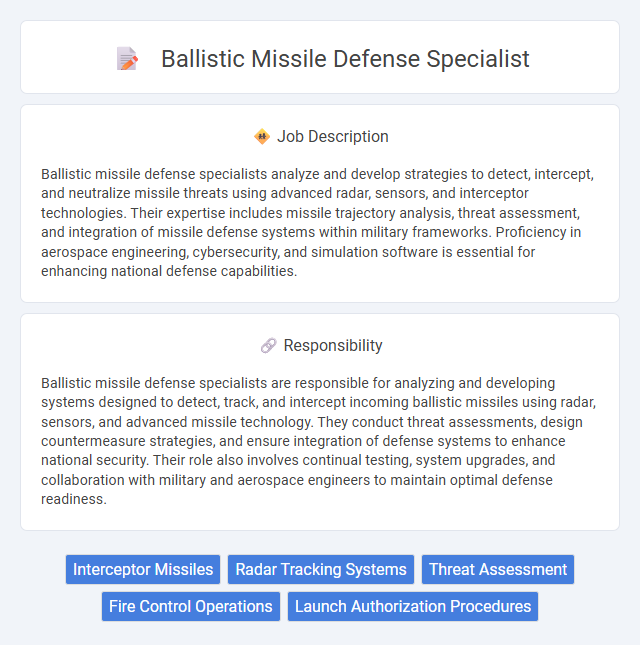
Ballistic missile defense specialists analyze and develop strategies to detect, intercept, and neutralize missile threats using advanced radar, sensors, and interceptor technologies. Their expertise includes missile trajectory analysis, threat assessment, and integration of missile defense systems within military frameworks. Proficiency in aerospace engineering, cybersecurity, and simulation software is essential for enhancing national defense capabilities.
Individuals with strong analytical skills and a high tolerance for stress are likely suitable for a ballistic missile defense specialist role, as the job demands quick, precise decision-making under pressure. Candidates who thrive in high-stakes environments and possess a background in aerospace, military technology, or engineering may be more inclined to succeed in this field. Conversely, those uncomfortable with intense responsibility or lacking technical expertise might find the position challenging and less fitting.
Qualification
A Ballistic Missile Defense Specialist requires a strong background in aerospace engineering, physics, or related fields, often holding a bachelor's or master's degree. Expertise in radar systems, missile technology, and threat assessment, complemented by experience with defense simulations and electronic warfare, is essential. Proficiency in data analysis, systems integration, and knowledge of national defense protocols further enhance job performance in this specialized role.
Responsibility
Ballistic missile defense specialists are responsible for analyzing and developing systems designed to detect, track, and intercept incoming ballistic missiles using radar, sensors, and advanced missile technology. They conduct threat assessments, design countermeasure strategies, and ensure integration of defense systems to enhance national security. Their role also involves continual testing, system upgrades, and collaboration with military and aerospace engineers to maintain optimal defense readiness.
Benefit
A ballistic missile defense specialist likely benefits from advanced technical training and hands-on experience with cutting-edge defense systems, increasing career opportunities within the defense and aerospace sectors. The role probably offers competitive salaries and security clearances that can lead to long-term employment stability. Opportunities for collaboration with government agencies and international partners may further enhance professional development and expertise.
Challenge
A ballistic missile defense specialist likely faces the challenge of constantly adapting to rapidly evolving missile technologies and countermeasures. They probably need to analyze complex threat data and develop innovative interception strategies under high-stress scenarios. The role may demand both strong technical expertise and quick decision-making to effectively protect against potential missile attacks.
Career Advancement
A ballistic missile defense specialist advances their career by gaining expertise in radar technology, missile interception systems, and threat analysis, often progressing to roles such as systems engineer or project manager. Continuous education and certifications in defense technologies and cybersecurity enhance prospects for leadership positions within defense contractors or government agencies like the Department of Defense. Networking within defense industry consortiums and participating in advanced research projects accelerate opportunities for senior technical or strategic roles in missile defense programs.
Key Terms
Interceptor Missiles
Interceptor missile specialists in ballistic missile defense systems design, test, and maintain advanced interceptor missiles to neutralize incoming threats. Their expertise includes radar integration, guidance systems, and kinetic kill vehicles to ensure precise target engagement and maximize interception success rates. They collaborate with defense agencies to enhance missile defense capabilities against evolving ballistic missile threats globally.
Radar Tracking Systems
Ballistic missile defense specialists focus on the development and operation of radar tracking systems to detect, track, and intercept incoming missile threats with high precision. Expertise in advanced radar technologies, signal processing, and real-time data analysis ensures accurate target identification and threat assessment. This role requires collaboration with defense engineers and use of sophisticated simulation tools to optimize missile defense system performance.
Threat Assessment
Ballistic missile defense specialists conduct comprehensive threat assessments to identify and evaluate emerging missile capabilities from global adversaries. They analyze missile trajectories, launch platforms, and potential target profiles using advanced radar and satellite data to develop effective intercept strategies. Their expertise supports the design and deployment of integrated defense systems that mitigate risks posed by ballistic missile threats.
Fire Control Operations
A Ballistic Missile Defense specialist in Fire Control Operations manages the targeting and engagement processes of defense systems to accurately detect, track, and intercept incoming ballistic threats. Expertise includes utilizing radar data, missile trajectory analysis, and real-time decision-making software to optimize missile launch timing and ensure precision hits. Proficient knowledge in integrated defense networks and threat evaluation enhances the effectiveness of missile defense strategies in dynamic combat scenarios.
Launch Authorization Procedures
Launch authorization procedures in ballistic missile defense involve rigorous verification protocols to ensure lawful and accurate engagement decisions. Specialists manage secure communication channels between defense command centers and interceptor units to confirm target identification and threat validation. Compliance with national security policies and real-time data integration are critical to prevent unauthorized or accidental missile launches.
 kuljobs.com
kuljobs.com